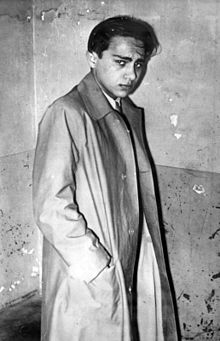Herschel Grynszpan
| Herschel Grynszpan | |
|---|---|

Grynszpan after his arrest, 1938
|
|
| Born |
Herschel Feibel Grynszpan March 28, 1921 Hanover, Germany |
| Disappeared | August 18, 1944 (aged 23) Magdeburg, Germany |
| Status |
Declared dead in absentia May 8, 1945 (aged 24) |
| Nationality | Polish |
Herschel Feibel Grynszpan (German: Hermann Grünspan; 28 March 1921 — last rumoured to be alive 1945, declared dead 1960) was a Polish-Jewish refugee, born in Germany. His assassination of the Nazi German diplomat Ernst vom Rath on 7 November 1938 in Paris resulted in the Kristallnacht, the antisemitic pogrom of 9–10 November 1938. Grynszpan was seized by the Gestapo after the Fall of France and brought to Germany. Grynszpan's eventual fate remains unknown. It was previously assumed that he probably did not survive the Second World War, and he was declared dead in 1960. However, a photo publicized in 2016 was claimed to be evidence that he was still alive in a relocation camp in Bamberg, Germany, as of 3 July 1946.
Herschel Grynszpan was born in Hanover, Germany. His parents, Sendel and Riva, were Polish Jews who had emigrated from Poland in 1911 and settled in Hanover, where Sendel opened a tailor's shop, from which the family made a modest living. Because of the German Citizenship Law of 1913, based on the principles of Jus sanguinis, Grynszpan was never a German citizen despite being born in Germany. They became Polish citizens after the First World War, and retained that status during their years in Germany. Herschel was the youngest of six children, only three of whom survived childhood. The first child was stillborn in 1912. The second child, daughter Sophie Helena, born in 1914, died in 1928 of scarlet fever. A daughter Esther was born on 31 January 1916, and a son, Mordechai, on 29 August 1919. A fifth child, Salomone, was born in 1920 and died in 1931 in a road accident. On 28 March 1921, Herschel was born.
...
Wikipedia
